The Supreme Court imposed limits on the Securities and Exchange Commission’s ability to compel defendants through the federal court system to disgorge profits earned through fraud.
In 2019, the SEC reportedly recovered a total of $3.2 billion in profits from people determined to have violated securities law. Disgorgement orders are different from the fines levied by the SEC.





